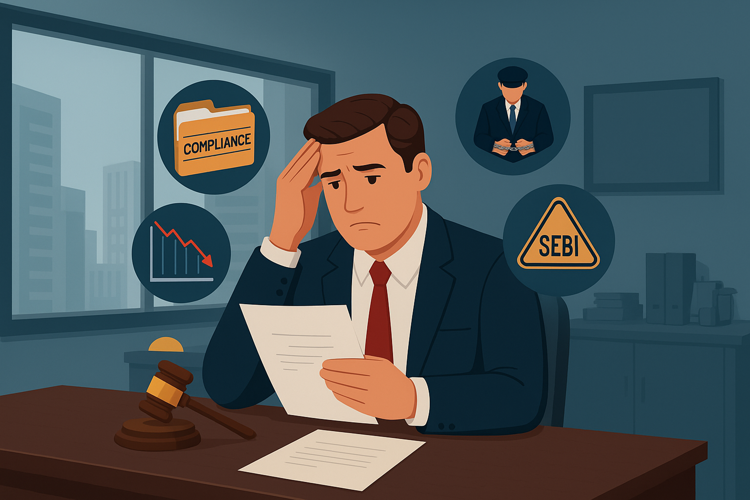CA Caught in Insider Trading? Here’s What Could Happen – It’s Worse Than You Think!

Naapbooks Insights • Insider Trading • 5 min read
In the world of finance and capital markets, few things are more damaging than being linked to insider trading. While the SEBI Prohibition of Insider Trading (PIT) Regulations, 2015 are often seen as targeted toward company insiders like CEOs or Directors, Chartered Accountants (CAs), especially those acting as fiduciaries are equally, if not more, vulnerable. One wrong move, even unknowingly, and your career could spiral out of control.
Here’s a breakdown of the real-world penalties and nightmare scenarios that could unfold if a CA is found non-compliant with SEBI’s insider trading norms.
Who Exactly is a Fiduciary?
Under SEBI PIT Regulations, fiduciaries include professionals like:
- Chartered Accountants
- Statutory or internal auditors
- Legal advisors
- Consultants and due diligence experts
If you're connected to a listed entity and have access to Unpublished Price Sensitive Information (UPSI), you’re on SEBI’s radar.
What Happens If You’re Caught?
1. Hefty Monetary Penalties
Under Section 15G of the SEBI Act, the penalty for insider trading is:
- ₹25 crores, or
- 3 times the profit made, whichever is higher.
Even for other forms of non-compliance (e.g., failure to report), penalties up to ₹1 crore can be imposed.
2. Debarment from the Securities Market
SEBI may:
- Prohibit you from trading, directly or indirectly.
- Ban you from acting as an auditor or consultant to listed companies.
The ban can be temporary (1–5 years) or even permanent, depending on the gravity of the offense.
3. ICAI Disciplinary Action
Yes, SEBI might notify the Institute of Chartered Accountants of India (ICAI).
- This could lead to suspension or cancellation of your CA license.
- Your name could be blacklisted from government panels, banks, and PSUs.
4. Criminal Liability
Under Section 24 of the SEBI Act, insider trading can result in:
- Up to 10 years of imprisonment
- Massive fines
- In severe or repeat cases, SEBI can push for criminal prosecution.
5. Disgorgement of Illegal Gains
Even if you didn’t personally trade, but passed on UPSI:
- SEBI can force you to disgorge profits made by others using your tip.
- This includes interest, legal fees, and investigation costs.
6. Reputation Ruined Publicly
SEBI’s orders are publicly available, often covered by media. The damage to your brand as a CA is:
- Immediate
- Global
- And long-lasting
No more listed clients. No more board roles. Possibly no more practice.
What You Should Be Doing Right Now
If you're a CA firm, internal auditor, or consultant to a listed company, these aren't just best practices, they’re survival tactics:
- Maintain a Structured Digital Database of who accessed UPSI
- Sign NDAs and follow Ethical Wall protocols
- Adhere to trading window restrictions
- Ensure compliance with Regulation 9A of PIT
- Provide regular PIT training to staff and partners
Real Case, Real Fallout
SEBI has penalized and debarred consultants and auditors in several insider trading cases, even when the actual trading was done by a relative. You don’t have to place the trade yourself to be held liable.
Bottom Line: One Violation Can End Your Career
Insider trading isn’t just about stock tips, it’s about trust. And for CAs, trust is everything. If SEBI finds you breached that trust, the consequences are devastating, legally, financially, and professionally.
Want to protect yourself or your CA firm from insider trading violations?
InsiderQ by Naapbooks is your all-in-one compliance solution, designed to help Chartered Accountants, auditors, and fiduciaries stay fully aligned with SEBI's PIT Regulations.
- Automate Structured Digital Database (SDD) management
- Track and control UPSI access logs
- Enforce trading window restrictions
- Generate audit-ready compliance reports in one click
Built for fiduciaries. Trusted by professionals. Backed by technology.
Get a Free Demo or request a custom insider trading compliance checklist powered by InsiderQ, before it’s too late.










